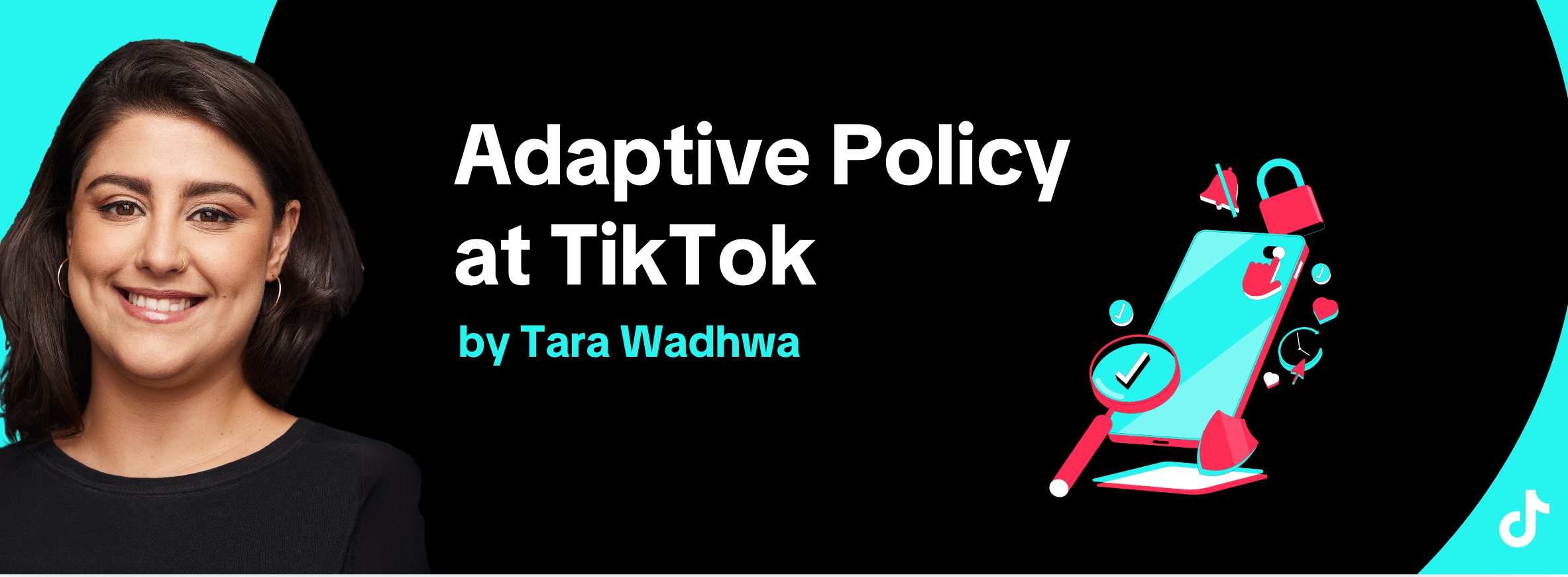When I first joined TikTok's Global Policy Team in February of 2019, I was one of the first American policy hires on the team. Since then, I've held a variety of roles focusing on trust and safety policy in the United States, and today I'm the Global Head of Regional Product Policy. From the start, my work involved rationalizing the safety policy framework and thinking through what our safety principles were, so that we could develop the safety policies needed to create a joyful experience on TikTok.
When I first joined TikTok's Global Policy Team in February of 2019, I was one of the first American policy hires on the team. Since then, I've held a variety of roles focusing on trust and safety policy in the United States, and today I'm the Global Head of Regional Product Policy. From the start, my work involved rationalizing the safety policy framework and thinking through what our safety principles were, so that we could develop the safety policies needed to create a joyful experience on TikTok.
When I first joined TikTok's Global Policy Team in February of 2019, I was one of the first American policy hires on the team. Since then, I've held a variety of roles focusing on trust and safety policy in the United States, and today I'm the Global Head of Regional Product Policy. From the start, my work involved rationalizing the safety policy framework and thinking through what our safety principles were, so that we could develop the safety policies needed to create a joyful experience on TikTok.
I came to TikTok from the NYU Stern School of Business, where I worked for the Center for Business and Human Rights. We looked at how we could leverage corporate commitments to advance human rights in a range of different sectors, from fast fashion to labor, and all the ways you can help people at scale. If you have an ambassador to Denmark, but not an ambassador to Walmart on matters of fast fashion, then are you really looking to solve the problem in the right way with all the resources available to you?
Then, I pivoted to the technology sector, where the traditional concerns were data privacy and freedom of expression. As I dove into it, I saw that there were a whole host of issues that policies hadn't really been created for yet. For example, what does hate speech and the evolution of hate speech really look like on social media platforms? What do conversations about mental health and body image look like? What are we doing to protect minors from things that they could be so easily exposed to on the internet, that they're not really developmentally ready for?
Joining TikTok, I was excited by the opportunity to see what a new global platform could do when it comes to being safety-first in tech. The way that everyone from CEO Shou Chew on down works to make sure people on the platform feel like they belong and can connect to the people that are most impactful to them. The diversity of content that we see on the platform is one of our strengths; you can find anything and relate to people globally. The platform has grown so much from what it originally was. With the addition of live streaming and monetization, we've had a really wonderful opportunity to build new policies to help protect people in every aspect of the platform.
A lot of the policies we've put in place that I'm most proud of answer the question, "how do we manage safety concerns and building a place where people can authentically be themselves?" We want people to talk about challenges that they've overcome, and what their life experience has been, but also be mindful at when that crosses the line into glorification and promotion. For example, any ads that promote weight management products cannot promote a negative body image or negative relationship with food. We partnered with the National Eating Disorder Association to connect people with resources to help anyone who may be struggling with body image issues if they interact with harmful content.
The power of the community has always been so strong on TikTok, and we want it to be a place where people can be met on their level. The content for those under eighteen will be different than that for adults, to give another example. Educational content is really great, but sometimes only relevant or appropriate for adults. So content classification becomes really important there, and people who are younger and still on their developmental journey aren't exposed to content that might not be appropriate for them. What I've loved about working on policy here has been that we don't have a one-size-fits-all policy framework that we export across all the markets that we serve. Everything is tailored to the relevant needs of different groups and locations.
Above all, working on policy at TikTok is a rewarding really way to feel like I am making an impact globally. When you come from a human rights background like I do, you always wanna make sure that you're doing good. This job has really given me that opportunity.
If you're interested in a career-shaping policy and creating the best possible experience for the TikTok community, explore open roles now.



